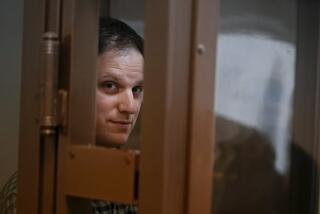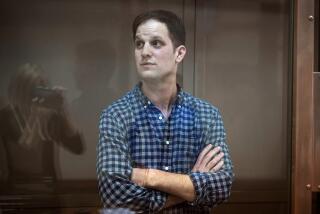Talks With Soviet Premier Cleared Air, Shultz Says
- Share via
WASHINGTON — As his official jetliner neared Washington early Sunday at the end of a 31-hour round trip to Stockholm, Secretary of State George P. Shultz thanked bleary-eyed Air Force crew members for their contribution to one of diplomacy’s longest days.
“If it is any comfort to you, I think this was an important trip for the country,” Shultz said.
The secretary of state seemed pleased with the outcome of his day’s work despite the late hour--about 20 minutes before 3 a.m. on a foggy Sunday morning. He had just traveled about 10 hours each way for the sake of about 10 hours on the ground in the Swedish capital.
The high point of the trip was a 105-minute meeting with the new Soviet premier, Nikolai I. Ryzhkov.
It was the first high-level U.S.-Soviet encounter since President Reagan and Soviet Communist Party leader Mikhail S. Gorbachev met last November in Geneva.
Shultz said the meeting helped to clear away some of the underbrush that has developed in the superpower relationship since the summit. He made it clear that the talks were useful, even though no substantive agreements were announced and despite the negative tone of the most widely quoted sentence of his statement: “We also agree that neither of us is satisfied with developments since that time (the summit).”
Shultz, in Stockholm for the funeral of slain Prime Minister Olof Palme, told reporters on the return flight that his and Ryzhkov’s dissatisfaction centered mostly on the slow pace of arms control talks. He said that in terms of bilateral issues between the two countries, “things are moving along pretty well.”
Shultz and other members of the U.S. delegation insisted that no agreements were reached on the date for the next Reagan-Gorbachev meeting or on anything else of substance. But U.S. officials said that such agreements were not the purpose of the Stockholm talks.
In the absence of any high-level contacts since November, the spirit of the Reagan-Gorbachev fireside summit has come under heavy strain. Gorbachev twice suggested that he would be unwilling to come to the United States this year for the second summit unless there is genuine progress in arms control talks first. And Reagan responded that if the Soviet leader does not come to the United States this year, there will be no Moscow summit next year.
Shultz said he and Ryzhkov discussed the next Reagan-Gorbachev summit without agreeing on a date. He said the matter would be considered further.
Shultz said his discussion with the premier was “practically all content,” meaning a systematic review by both sides of the key issues in the Washington-Moscow relationship. This is the format that Shultz prefers for talks with Russian leaders. It gives him a chance to underline U.S. positions and to remove any cause of misunderstanding.
Shultz also indicated that he formed a businesslike relationship with Ryzhkov, who has been the chief of Soviet government since last Sept. 27.
More to Read
Sign up for Essential California
The most important California stories and recommendations in your inbox every morning.
You may occasionally receive promotional content from the Los Angeles Times.













